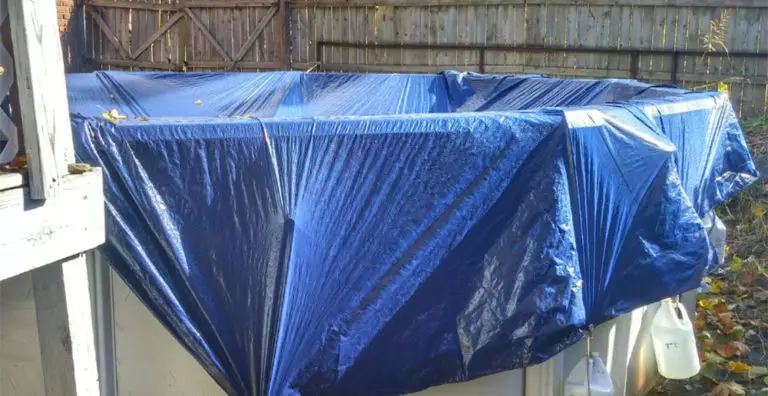If you’re an above ground pool owner, then you probably dread winter. The bad weather, the short days, and cold temperatures – what’s to love?
And winter is often made worse by the fact that you have to get your pool ready for the dreaded season.
But while there are a few steps involved in closing your pool for the winter, such as applying a quality above ground pool winter cover, closing your pool’s filtration system couldn’t be easier.
Below, we’ll explain what winterizing your above ground swimming pool filter involves, why you need to winterize your pool and when, and how to properly winterize your above ground pool with a sand filter.
What Does Winterizing A Pool Filter Mean?
Unless you live in the tropics and can swim all year round, you’ll probably want to shut your pool down for the winter to save on your monthly energy bill without running your pump for eight hours or so a day.
Also, if you live in a place where the temperatures plummet to freezing in winter, not shutting your pool down or properly winterizing your pumps can be pretty costly.
Part of properly closing your pool involves closing your pool filtration system, which means disconnecting it from its power source, cleaning it out, uninstalling it, and storing it away.
Why It’s Important To Winterize Your Pool’s Sand Filter
It’s only important to winterize your swimming pool sand filter if you’re not going to be running your system in the winter. If this is the case, then you should winterize your pool for the following reasons:

Cracking
If you live in a place that experiences freezing winter temperatures, not closing your pool filtration system properly could lead to cracked pipes.
You should make sure to not just close down your filter for the season, but also blow out your pool lines.
Bad Bacteria
While closing down your pool filter by unplugging it is a simple solution, all the contaminants that your filter picks up will be left to fester in perfection conditions for months.
After all, your water passes through your filter before returning to the pool. You’re not going to want a bunch of gunk in your filter tank come spring.
Extreme Exposure
Even if your filter doesn’t crack, leaving it outdoors for the winter could cause avoidable wear and tear.
We probably don’t need to tell you that filter犀利士 s don’t come cheap, so taking care of your filter by winterizing it properly and storing it in a safe, dry place will avoid unnecessary expense.
When to Winterize Above Ground Pool Filters
When it comes to a good swimming pool closing routine, a few steps that make use of a working filter have got to be checked off the list before you fully shut it down for winter.
It’s important to winterize your filter at the proper time, after you’ve brushed your pool, vacuumed your pool, and achieved the perfect chemical balance, including shocking your pool with a reliable pool shock.
Your pool will also need to be drained, if needed. If you’ve done all of the above then you’re ready to go.
How To Winterize A Pool Sand Filter
Sand filters are popular for both inground and above ground pools for a reason. They’re efficient and they get the job done!
They’re designed to catch particles that are in the 20-100 micron range, but you can switch the sand media to glass that can trap even smaller particles.
The more you use a sand filter, the more jagged and trapping the media gets until the tank is so pressured that you need to switch it out entirely, and this usually only happens every few years.
Of course, switching your sand every time you shut your pool down is a waste of time and money.
The goal, then, is to keep your filter pump, your hoses, and your filter media sorted and safe for winter, ready to go for spring.
Winterizing a sand filter will make you very familiar with your top mount valve, which is located at the top of your sand filter pump.
1. Begin With A Backwash
Your sand filter will catch a lot of gunk and you’re not going to want it sitting, festering and potentially growing during the winter, especially since your ideal storage place is a safe, indoor place that could be just the right temperature for bacteria to thrive.
To keep your sand filter fresh, give it a backwash. You’ll know you’re done when the water runs clear from the nozzle. Then you can power down and move on to the next step.
2. Give It A Good Rinse
After you’ve finished with your backwash, you can now move the valve to the ‘rinse’ position and let it run for thirty seconds. This is another measure to ensure bacteria don’t make themselves at home on your above ground swimming pool pump.
3. Wrench The Valve To “Winterize”
Now that your sand or other media is as clean as it can possibly be, you can turn that valve to the ‘winterize’ setting. This will let the water drain from the valve.
4. Disconnect The Drain Cap
You’ve now sorted out the top mount valve of your filter pump, but your filter tank is still full of water. This water isn’t going to store well through the winter.
So you’ll need to completely drain all the water from the tank by unscrewing and removing the drain cap at its bottom.
Because you won’t be attaching the cap, make sure it’s stored somewhere where you easily find it in the spring. You should also remove all your filter’s hoses while you’re at it.
5. Store It Away Safely Out of The Weather
Now the tank is drained, the hoses have been removed, and the drain cap is off. So all you need to do now is properly and safely store the sand filter, pump, hoses and drain cap in a dry, safe place for the winter.
This can be difficult to do on your own as the sand can be heavy even when the water is drained, so ask another person to help you with this.
But once it’s stored away you’re all done. All that’s left to do now is look forward to the spring! If you prefer to watch a video on how to properly winterize a pool sand filter for an above ground swimming pool, check out the detailed talk-through video by Swimming Pool Steve below!

Hello, I am a writer and marketing specialist in Kansas City, MO. My love for swimming pools started as a child when I would visit my aunt & uncle’s inground swimming pool on a frequent basis over the summer. Since then I have taught swimming lessons at a Boy Scout Camp, participated in the full setup, installation and maintenance of my father’s inground swimming pool, as well as enjoyed constantly researching everything there is to know about swimming pools for 5+ years. I enjoy all water related sports, being part of the online swimming pool community and always learning new things!


Leave a Reply